We generally across swelling in different local areas such as - face, feet etc. or throughout the body. Even though it usually appears as a symptom but in also in so many diseases related to vital organs like - liver, kidney, uterus, brain etc.
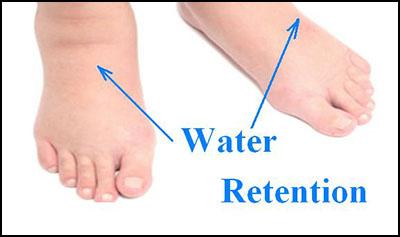
Swelling may appear as individual disease itself due to imbalanced dosha. Due to the causative factors, the Vata dosha, blood, Kapha and Pitta are vitiated and they are lodged in veins which start circulating in the body and extremities. Due to defect in circulation, the muscle and skin are badly affected and ultimately become hard and elevated swelling is resulted. According to Ayurveda, inflammation or swelling is of three types. Master Charak has explained it in the 18th chapter of Sutrasthana.
Three types of swelling according to Charak Samhita
- Vataja - arising due to Vata dosha imbalance
- Pittaja - arising due to Pitta dosha imbalance
- Kaphaja - arising due to Kapha dosha imbalance.
It is again of 2 types
- Nija - Due to internal causes within the body (due to endogenous factors)
- Agantuja - Due to external causes like - injury (due to exogenous factors).
Aetiology of exogenous swellings-Agantu Shotha Nidaana-
- Excision wounds
- Incision wounds
- Fracture
- Grinding
- Exposure to excessive pressure
- Tight tying
- Twisting by snake/ tight wrapping
- Compression/squeezing
- Piercing
- Bristles of poisonous insects/creepers/harmful leaves
Endogenous and Exogenous Swellings
The exogenous swelling is diagnosed by the characteristic etiology, signs and symptoms whereas the endogenous swelling starts with the vitiation of doshas and bring about pain. The exogenous swelling on the other hand, starts with the pain and brings about the vitiation of doshas.
Aetiology of Endogenous Swelling
Endogenous swelling is caused due to
- A chronic disease
- Due to fasting
- Walking long distance
- Suddenly consuming exceedingly heavy/sour/salty food
- Consumption of alcohol
- Consumption of meat of marshy or aquatic animals
- Excessive intake of salt
- Adoption of improper regimen after delivery and excitation of doshas in females
- Pressure on gravid uterus in females
Clinical features of Vataja swelling - By the intake of cold, non-slimy, exertion, unctuous light food, fasting for a long time Vata in the body gets aggravated and afflicts the skin, flesh, blood etc. and causes swelling. The swelling thus may appear and disappear disruptly. Swelling is either of blue or reddish in colour. It is mobile and it throbs. The skin and hair over the swelling part are rough, hard and broken. Due to this, the pain due to swelling resemble cutting, splitting, pressing, pinching by needles, crawling by ants etc.
Clinical features of Pittaja swelling - By the intake of pungent, bitter, alkaline, hot, saline, sour, salty and heavy food and exposure to heat, fire, sun, the Pitta gets aggravated and affects the skin, flesh and blood and thus the swelling is caused. It may be black, blue, yellow and coppery in colour and hot and soft in touch. It appears and disappears abruptly. The hair on the swelling area becomes coppery and light gray and due to this there is a feeling of hot sensation, pain, emission of smoke, steaming and sloughing and it is not able to stand hot touch.
Clinical features of Kaphaja Swelling - Due to the intake of heavy, sweet, cold and unctuous diet, lack of exercise, excessive sleep, Kapha dosha gets aggravated and it affects skin, muscles, blood and causes Shlaishmika type of swelling. Such type of swelling takes a long time to manifest and cure. Swelling is apparently pale white colour, heavy, smooth, unctuous, immobile and have white hair in the border. It withstands pressure and heat.
According to the etiology there are 3 more types of swellings due to the combined morbidity of the Doshas- ( Vata-Pittaja, Vata-Kaphaja and Pitta-Kaphaja).
There is only one Sannipatika type of swelling arising due to combined morbidity of all the three doshas and it manifests signs and symptoms of all 3 doshas.
General symptoms of swelling
- Thinning of the affected skin surface
- Numbness
- Red or black discoloration
- Roughness
- Occasional pain
- Soft oedematous lesions
- Vertigo
- Fever
- Thirst
- Sepsis
- Black or yellow coloured lesions
- Severe burning
- Instant ulceration
- Tastelessness
- Nausea
- Excess sleep
- Stable and thick oedema
- Oedema worsening during night time
Simple home remedies for swelling
- Regular consumption of 1 pinch of turmeric along with half teaspoon of ginger and honey relieves swelling.
- Erandmoola, Jeeraka and Gokshura are taken in equal quantity and decoction is prepared. This is capable of providing relief from swelling.
- 1 teaspoon of Punarnava, turmeric and ginger are taken in a vessel. 2 cups of water are added, boiled and reduced to half. 20 ml dose of this preparation must be taken 2 times a day before food with a small piece of jaggery.
Punarnava capsules of Planet Ayurveda for swelling
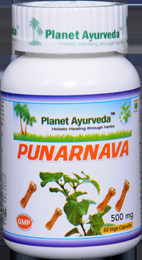
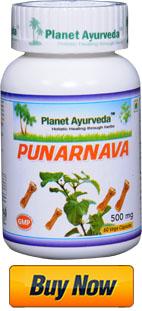
Punarnava capsules of Planet Ayurveda are very helpful in the treatment of swelling or oedema due to any reasons as it reduces inflammation in a natural way without any side effects. Punarnava capsule of Planet Ayurveda is a pure herbal product. The herb Punarnava helps to promote health of the urinary tract and also helps to maintain efficient kidney function. It helps in water retention caused by any reasons which can be liver, kidney, heart problems or even venous insufficiency.
Single drug recommended in swelling - Castor root, ginger, Punarnava, Tribulus, cumin seeds, Shilajit, turmeric, shallaki etc.
Unwholesome diet - salty, dry vegetables, heavy food, pulses, spicy food, long walk, curd, sour substances must be avoided.
It must be noted that swelling is a simple health complaint if it is localised one or is of recent origin whereas the generalised swelling with chronic history denotes serious underlying pathology. So one should take immediate attention towards such problems.
DR. Vikram Chauhan, MD - AYURVEDA is an expert ayurvedic doctor based in Chandigarh, India and doing his practice in Mohali, India. He is spreading the knowledge of Ayurveda - Ancient healing treatment, not only in India but also abroad. He is the CEO and Founder of Planet Ayurveda Products, Planet Ayurveda Clinic and Krishna Herbal Company. Write at - [email protected], Contact at - +91-172-521-4030 Websites - www.planetayurveda.com, www.alwaysayurveda.com
View more posts from this authorWe generally across swelling in different local areas such as - face, feet etc. or throughout the body. Even though it usually appears as a symptom but in also in so many diseases related to vital organs like - liver, kidney, uterus, brain etc.
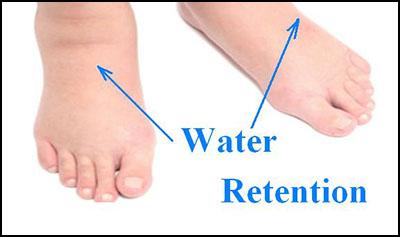
Swelling may appear as individual disease itself due to imbalanced dosha. Due to the causative factors, the Vata dosha, blood, Kapha and Pitta are vitiated and they are lodged in veins which start circulating in the body and extremities. Due to defect in circulation, the muscle and skin are badly affected and ultimately become hard and elevated swelling is resulted. According to Ayurveda, inflammation or swelling is of three types. Master Charak has explained it in the 18th chapter of Sutrasthana.
Three types of swelling according to Charak Samhita
- Vataja - arising due to Vata dosha imbalance
- Pittaja - arising due to Pitta dosha imbalance
- Kaphaja - arising due to Kapha dosha imbalance.
It is again of 2 types
- Nija - Due to internal causes within the body (due to endogenous factors)
- Agantuja - Due to external causes like - injury (due to exogenous factors).
Aetiology of exogenous swellings-Agantu Shotha Nidaana-
- Excision wounds
- Incision wounds
- Fracture
- Grinding
- Exposure to excessive pressure
- Tight tying
- Twisting by snake/ tight wrapping
- Compression/squeezing
- Piercing
- Bristles of poisonous insects/creepers/harmful leaves
Endogenous and Exogenous Swellings
The exogenous swelling is diagnosed by the characteristic etiology, signs and symptoms whereas the endogenous swelling starts with the vitiation of doshas and bring about pain. The exogenous swelling on the other hand, starts with the pain and brings about the vitiation of doshas.
Aetiology of Endogenous Swelling
Endogenous swelling is caused due to
- A chronic disease
- Due to fasting
- Walking long distance
- Suddenly consuming exceedingly heavy/sour/salty food
- Consumption of alcohol
- Consumption of meat of marshy or aquatic animals
- Excessive intake of salt
- Adoption of improper regimen after delivery and excitation of doshas in females
- Pressure on gravid uterus in females
Clinical features of Vataja swelling - By the intake of cold, non-slimy, exertion, unctuous light food, fasting for a long time Vata in the body gets aggravated and afflicts the skin, flesh, blood etc. and causes swelling. The swelling thus may appear and disappear disruptly. Swelling is either of blue or reddish in colour. It is mobile and it throbs. The skin and hair over the swelling part are rough, hard and broken. Due to this, the pain due to swelling resemble cutting, splitting, pressing, pinching by needles, crawling by ants etc.
Clinical features of Pittaja swelling - By the intake of pungent, bitter, alkaline, hot, saline, sour, salty and heavy food and exposure to heat, fire, sun, the Pitta gets aggravated and affects the skin, flesh and blood and thus the swelling is caused. It may be black, blue, yellow and coppery in colour and hot and soft in touch. It appears and disappears abruptly. The hair on the swelling area becomes coppery and light gray and due to this there is a feeling of hot sensation, pain, emission of smoke, steaming and sloughing and it is not able to stand hot touch.
Clinical features of Kaphaja Swelling - Due to the intake of heavy, sweet, cold and unctuous diet, lack of exercise, excessive sleep, Kapha dosha gets aggravated and it affects skin, muscles, blood and causes Shlaishmika type of swelling. Such type of swelling takes a long time to manifest and cure. Swelling is apparently pale white colour, heavy, smooth, unctuous, immobile and have white hair in the border. It withstands pressure and heat.
According to the etiology there are 3 more types of swellings due to the combined morbidity of the Doshas- ( Vata-Pittaja, Vata-Kaphaja and Pitta-Kaphaja).
There is only one Sannipatika type of swelling arising due to combined morbidity of all the three doshas and it manifests signs and symptoms of all 3 doshas.
General symptoms of swelling
- Thinning of the affected skin surface
- Numbness
- Red or black discoloration
- Roughness
- Occasional pain
- Soft oedematous lesions
- Vertigo
- Fever
- Thirst
- Sepsis
- Black or yellow coloured lesions
- Severe burning
- Instant ulceration
- Tastelessness
- Nausea
- Excess sleep
- Stable and thick oedema
- Oedema worsening during night time
Simple home remedies for swelling
- Regular consumption of 1 pinch of turmeric along with half teaspoon of ginger and honey relieves swelling.
- Erandmoola, Jeeraka and Gokshura are taken in equal quantity and decoction is prepared. This is capable of providing relief from swelling.
- 1 teaspoon of Punarnava, turmeric and ginger are taken in a vessel. 2 cups of water are added, boiled and reduced to half. 20 ml dose of this preparation must be taken 2 times a day before food with a small piece of jaggery.
Punarnava capsules of Planet Ayurveda for swelling
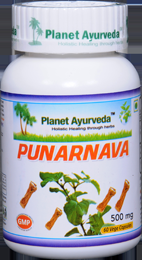
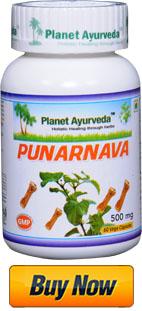
Punarnava capsules of Planet Ayurveda are very helpful in the treatment of swelling or oedema due to any reasons as it reduces inflammation in a natural way without any side effects. Punarnava capsule of Planet Ayurveda is a pure herbal product. The herb Punarnava helps to promote health of the urinary tract and also helps to maintain efficient kidney function. It helps in water retention caused by any reasons which can be liver, kidney, heart problems or even venous insufficiency.
Single drug recommended in swelling - Castor root, ginger, Punarnava, Tribulus, cumin seeds, Shilajit, turmeric, shallaki etc.
Unwholesome diet - salty, dry vegetables, heavy food, pulses, spicy food, long walk, curd, sour substances must be avoided.
It must be noted that swelling is a simple health complaint if it is localised one or is of recent origin whereas the generalised swelling with chronic history denotes serious underlying pathology. So one should take immediate attention towards such problems.

